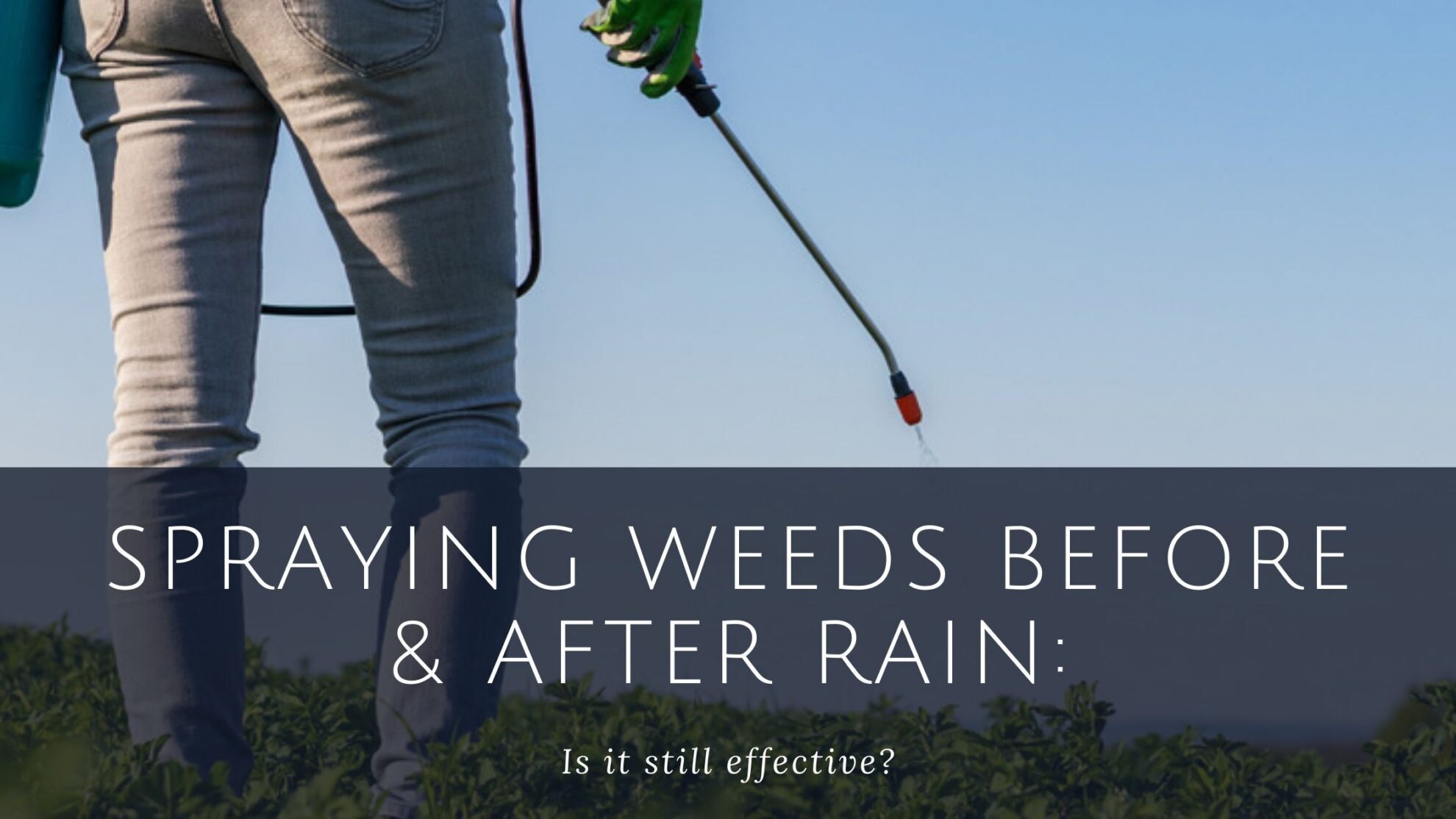
The most common way to deal with pesky weeds in your garden is to spray them with herbicides. However, simple as it may sound, this can be a surprisingly complicated task. Not only do you need the right herbicide for the job, but you also have to ensure the timing is perfect, or your efforts may be wasted entirely. So if bad weather is on the horizon, do you spray before the rain or afterwards? If so, how long should you wait after rain to apply a herbicide?
When spraying weeds, you’ll need to allow enough time for the herbicide to work before any rain falls. To effectively kill weeds, it’s recommended that you spray 30 minutes to an hour before rain, if not earlier, depending on the brand you choose. After it rains, wait for the leaves to dry out before spraying, or the herbicide may be washed away.
Whatever the weather conditions, you should always check the day’s forecast for the day before spraying weeds, including the temperature, wind and rain predicted. Herbicides work best when the leaves are dry, so it may be a waste of effort and product to spray right before or after a shower.
Using a backpack sprayer or hand sprayer is most common for home gardeners, but it does involve getting up close and personal with whatever herbicide is being applied. Even the most experienced gardener can be caught out if they fail to read the weed spray label since every product works a little differently. It is better to be cautious when spraying herbicides than rush everything, as they are potent chemicals and can be a safety hazard if misused.
If you are still confused about what to do, give this article a scroll and find out when is the best time to spray weeds.
Table of Contents
Does Rain Affect Herbicide?
Yes, rain affects herbicide efficacy because rainwater simply washes it away from the surfaces that need treatment. This is why it is not advised to spray weeds when it’s raining or right before it’s about to rain.
Herbicides need to be absorbed into the leaves to kill the unwanted plants. Some herbicides need a dry, rain-free period of up to 6 or 8 hours for the solution to soak in, and these requirements should be indicated on the package. Other stronger brands like Roundup only need 30 minutes on the leaves to be effective, and rainfall after that time won’t stop the product from working correctly.
Here are some more timing tips when it comes to herbicides:
- Spraying immediately after it rains is not also advised. You need to wait for the leaves to dry before spraying for the product to work. Applying right after rain is similar to spraying before the rain, simply because the weeds are still wet and the herbicide is washed away. The droplets of rain can also dilute the herbicide and make it less effective.
- If you decide to apply herbicide 30 minutes or more before the rain, you may want to check the wind conditions too. Avoid spraying weeds if the wind has picked up ahead of a storm, or in any particularly breezy conditions. Wind can cause the herbicide to drift and cause damage to plants you don’t plan on killing.
If you follow these basic requirements for weed control, you can get the desired result and safely kill off weeds in your backyard. Read on to learn more factors that influence when it’s best to apply herbicide treatments.
Can I Spray Weeds Before Rain?
If you want to spray weeds before it rains, you’ll need to ensure there’s enough time for the herbicide to dry and be absorbed by the plant. Each weed spray will have its own requirements, so the best source of information is the product label itself.
As previously mentioned, it is never a good idea to spray when it is raining or just a few minutes beforehand. It will only decrease the herbicide’s effectiveness, if any product is absorbed at all, and might not succeed at killing the weeds.
How long does herbicide need to be on before rain?
If you are pressed for time and you can see signs that it’s about to rain, you’ll want to use a fast-acting herbicide like Roundup. It will only take 30 minutes for Roundup’s effective herbicidal solution to soak into the leaves, though even the manufacturers suggest the safest option is waiting up to 3 hours.
And, because the weather is always unpredictable, it may rain sooner than the expected 30 minutes – so it’s best not to cut it too close.
 Can I Spray Weeds After Rain?
Can I Spray Weeds After Rain?
Spraying weeds after rain can also work, as long as you wait for the foliage to dry. Make sure that no more rain is expected – sneaking in a quick spray between showers isn’t a great tactic in this case. Herbicides work best when the leaves are dry before spraying, or the chemicals can easily run off the leaf without being absorbed by the plant.
How Soon After Rain Can I Spray Weeds?
Essentially, you want to make sure you don’t spray weeds when they’re wet – whether that’s from rainfall, irrigation or dew.
Waiting for the leaves to dry may take hours and sometimes it will take longer when the weather is cooler. That’s not always convenient, but it does mean you won’t be wasting your time or your money applying an ineffective chemical.
Still, always make sure to spray after the leaves have dried, and if it does rain again unexpectedly after applying your herbicide, you may need to repeat the application.
When Is The Best Time To Spray Weeds?
Choosing the best time to spray means considering how the conditions are going to affect the product. Here are some factors and tips to keep in mind:
Can I spray weeds when it’s hot and dry?
Most expert gardeners say that it is better to delay spraying stressed weeds until after rainfall rather than spraying them in dry conditions. One of the survival mechanisms of plants when stressed is to thicken their cuticle, which reduces the moisture of the leaves. When the moisture is reduced during hot dry periods, it also reduces the uptake of herbicide. If you live in a hot climate, this will affect the best time of year to spray weeds.
Some gardeners spray moisture-stressed weeds when there’s a sign of rainfall, thinking they can reduce weed seed set. However, waiting for new leaves after the rain is a better strategy, leading to more effective elimination of weeds. This is verified by Peter Newman, the communication lead of the Australian Herbicide Resistance Initiative.
 When should I apply pre and post-emergence herbicides?
When should I apply pre and post-emergence herbicides?
Pre and post-emergence herbicides are applied specifically during the emergent phase of weeds.
Pre-emergence herbicides are commonly used in established lawns and help to disrupt the weed’s life cycle. Gardeners should apply this herbicide before weed seeds start to germinate and reapply eight weeks after the first spray.
Post-emergence herbicides are applied when the weeds are fresh and young. This type of herbicide kills weed upon contact because the chemical is absorbed into the plant tissue.
What is the best time of day to spray weeds?
The most critical factor on when is the best time to spray weeds is the weather, so this will vary from season to season. Most herbicides work best when application occurs during several days of dry weather, but not extended dry periods. It should not be too hot or dry, because the heat stress will reduce the weed’s capacity to absorb the herbicide.
This is also the same with winds – if it’s too breezy, the spray will drift off from the target plants and affect the rest of your garden.
And one final tip:
If you live close to a next-door neighbour, you should also consider communicating with them and discussing your plans to spray weeds. This is so that you can avoid inconvenience to them and their property. The same should happen in your own household, informing everyone about it so pets, children, or other potted plants aren’t in the area during or after spraying herbicides.
Related Questions
Do you have to pull weeds after spraying?
Only pull the weeds when they are completely dead. If you leave dead weeds in your garden, the dead plants can accumulate and cause new unwanted plants to grow from residual seeds. It’s always best practice to remove weeds from your garden altogether, even if you’ve already sprayed them with herbicide.
How do you stop weeds from growing back?
Good garden maintenance practices such as regular watering, mowing, mulching and fertilising are the best foundation for weed management in lawn and garden beds. The only way to keep your garden weed-free is to care for and continuously maintain it – weeds may inevitably turn up sooner or later, but you should take measures to eliminate them quickly before they have a chance to spread.
Disclaimer:
This article is published for general informational purposes only and does not constitute professional advice. Any action you take upon the information you find on this website is strictly at your own risk. Always ensure you have the right qualifications and certifications to carry out DIY work and never put your safety at risk. Hills Irrigation recommends consulting a professional for all electrical and plumbing work.

Vince is Managing Director of Hills Irrigation and is supported by Lisa in an administrative capacity. Andrew, Isaac and Megan look after the day to day needs of both online and shop customers. As Project Manager, Vince is also responsible for installation projects along with his team. It is his responsibility to work closely with clients to ensure that scope of work is understood and followed.






